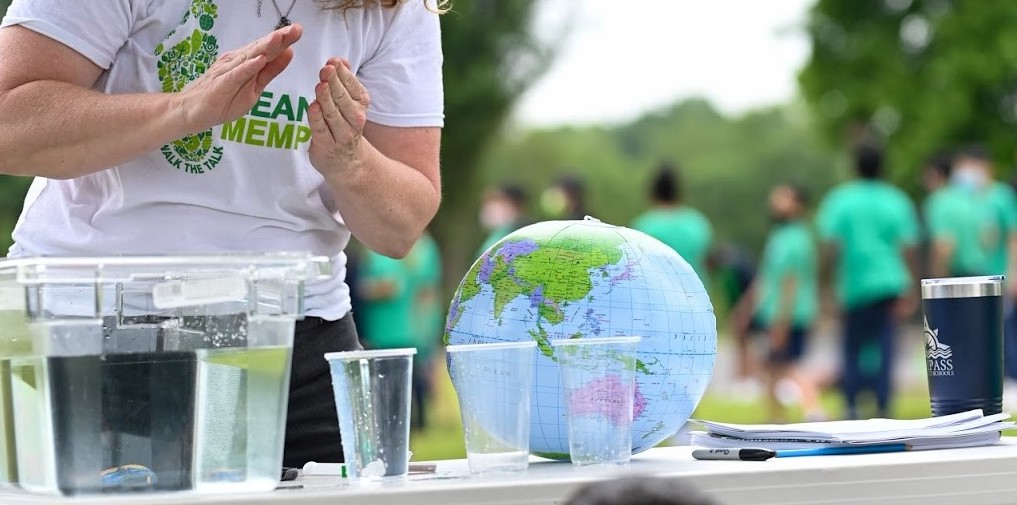No longer are teachers urging students to simply pick up litter and put it in the trash. Instead, teachers are being trained by Clean Memphis to lead children to study trash around their school and community. Instead of throwing it directly into bins, the students are being taught to use an app—Litterati—on their phones. The app allows children to identify what the litter is made of. After being examined and reported, the trash is dropped into a bin. The litter’s content and GPS location are submitted to Clean Memphis and to trackers, both local and world wide. This information is used by planners, to make informed decisions about where to put more trash bins, and identify businesses that need to be encouraged to cut down on their single-use items like straws, french-fry boxes, paper plates and sandwich wrappers. Meanwhile, students become citizen scientists. They become part of the solution to today’s environmental problems.
Michelle Cowan is the Director of Education at Clean Memphis. She and two other Clean Memphis educators go directly into the elementary classroom, bringing supplies and resources, and teaching standard-based lessons to students in Shelby County Schools. As part of the Water Is Wonderful curriculum, developed in partnership with International Paper, students fill a five-gallon tub with water. Out of that tub of water, they spoon thirty-four tablespoons into a smaller container. The smaller amount of water is comparable to the amount of freshwater available for use on our planet, and what remains in the larger tub of water is comparable to the amount of salt water on the planet. Students learn where fresh water is most scarce, and they are taught strategies for conserving water and protecting our water sources.

“Children are excited about our program, and I think it is because they learn ways to make a difference; they can see the impact of choosing to be part of the solution. It’s lovely to watch them get engaged with ideas around caring for the environment. They’re not just learning slogans, but they are involved in research.” Cowan speaks with the intensity of one who cares deeply about both the environment and education of children. Sitting on the front porch swing of Clean Memphis’s home office, with colorful leaves raining down from an old oak tree, she shares her enthusiasm for the program and the partnership between Clean Memphis, International Paper, and Mid-South elementary students and their teachers.
Though headquartered in Memphis, International Paper has a global presence. It acquires much of its raw materials from Brazil, and has offices in Mexico and France as well as in the United States. The Water Is Wonderful curriculum needed to be translated into Portuguese, Spanish and French so children around the world can learn about conserving and caring for water. Cowan’s son just happened to be graduating from university with a degree in Portuguese, Spanish, and French. He was hired by International Paper to translate the teacher guides, worksheets, and other resources into three different languages. “That made the project even more personal,” said Cowan, beaming with a mother’s pride.
Paper requires a lot of water to produce, but International Paper takes seriously their role as a water steward in the communities where they operate. They have continuously improved their overall water footprint since 2010, including significant improvements in the quality of treated water returned to the environment and total water use per ton of production. IP returns more than 90% of the water that they use back into waterways, and water is reused up to ten times during the paper making process.
Through the Water is Wonderful lessons, children learn that water is essential to life and makes up more than 2/3 of our planet, though only a small fraction of that water is available for use by the billions of people on earth. They learn about the properties of water, how pollution gets into plants and how responsible forest management can help to sustain a clean water supply. As a result of the hands-on lesson plans, students develop habits that help to conserve clean water for all of us: picking up their dog’s waste, not running the water while brushing their teeth, and cleaning out storm drains in their neighborhood. All of these practices contribute to building a cleaner environment and a healthier future for our planet.
Elaine Blanchard is a writer, social activist, and ordained minister in the Disciples of Christ denomination. She moved to Memphis in 1994. She and her wife, Anna, are proud Midtown Memphians.

